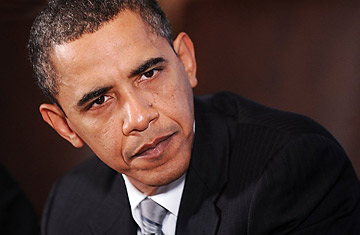
It has taken President Obama three months to reach the decision on Afghanistan that he'll share with the nation on Tuesday night, because there are no easy solutions. His chosen path will win applause from some quarters but boos from others. Here's a scorecard outlining the key questions the speech will address, to determine what proposals Obama has embraced and the risks he's willing to accept — and who's likely to be pleased or ticked off as a result.
How Many Troops?
Obama is expected to give Army General Stanley McChrystal somewhat less than the 40,000 troops he requested in the midsize of the three options he presented to the President. Like a kid seeking a $10 weekly allowance who starts the bidding at $20, McChrystal's "lowest-risk" option was for some 80,000 reinforcements. But both he and the Pentagon knew that the U.S. military doesn't have enough troops for such an increase. McChrystal's smallest option — about 10,000 more troops — was scrapped because the U.S. military felt it was too risky. They've coalesced around the "Goldilocks option" of 40,000, minus what some Pentagon officials call a "Commander in Chief's tax" to show who's in charge. (Some of the difference will be made up by 5,000 extra troops expected from allies.) The troop decision will win grudging support from congressional Republicans and the military, but it will anger lawmakers in the President's party. Many Democrats will see in this second escalation, following the 21,000 additional troops Obama dispatched earlier this year, an echo of President Lyndon B. Johnson's doomed Vietnam strategy.
How Long Will This War Continue?
Obama's biggest challenge is to send the enemy and allies involved in the war a message of America's resolve to prevail by sending more troops, while reassuring his domestic audience that Afghanistan is no quagmire. That tension — time is an ally of your foes if they know when you're going to pull out — can't be papered over. The more explicitly Obama lays out timetables, benchmarks and deadlines, the less impact his reinforcements are likely to have on the ground. So look for him to insist that this isn't an open-ended commitment, while refraining from specifying just what that means. Many Democrats, and most of the public, will cheer his pledge to leave, while much of the GOP and military will embrace the ambiguity in which it is wrapped.
How Big an Afghan Army?
The U.S. and additional NATO reinforcements will include between 5,000 and 10,000 soldiers dedicated to training new recruits to the Afghan National Army, the growth of which is the key condition for eventual coalition withdrawal. McChrystal hopes to double the size of the Afghan security forces to about 400,000 men. But the time and money needed to generate and maintain an army and police force whose combined size would be close to that of the 550,000-strong U.S. Army is a daunting task in impoverished and war-torn Afghanistan. So don't look for Obama to announce any big hike in the size of the Afghan army. Instead, he'll leave discussion on its size to Congress, where hearings on the war are slated in the coming days.
How Will the U.S. Pay for the War?
Many of Obama's Democratic allies in Congress are already saying that any
reinforcements should be paid for with a war surtax. That, of course, is a fiscal fig leaf for antiwar sentiment within the party that helped win Obama its presidential nomination. The tax proposal may make political sense during a recession, but the estimated cost of the additional troops — perhaps $40 billion annually — is just over 1% of this year's federal budget. Don't expect Obama to play bean counter tonight, which will upset Democrats more than the GOP.
How to Pressure the Locals to Do Their Part?
The Administration plans on creating "benchmarks" for Afghanistan and Pakistan to meet in order to retain the commitment of U.S. troops and money to the conflict. But long-standing corruption and incompetence can't be quickly
eradicated. "The Pakistani and Afghan governments are both next to useless
when it comes to this issue," Democratic Representative Dave Obey of Wisconsin, chairman of the House
Appropriations Committee, tells TIME. So look for fairly elastic benchmarks,
which will only please those who are required to meet them.
What's the Bottom Line?
Obama's decision carries high stakes for the thousands of Americans he's
ordering into harm's way as well as for Afghanistan itself. But there's one
more consequence he's unlikely to mention but can't avoid. The speech will
underscore Obama's ownership of the Afghan mission, says Anthony Cordesman, a military scholar with the Center for Strategic and International Studies. By 9 p.m. E.T., Cordesman says, Obama will "have to take personal responsibility for the outcome of the war ... betting his historical reputation and second term on the outcome."
